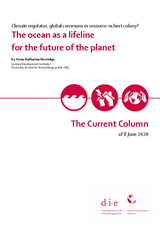Climate regulator, global commons or resource-richest colony?
The ocean as a lifeline for the future of the planet
Hornidge, Anna-KatharinaThe Current Column (2020)
Bonn: German Development Institute / Deutsches Institut für Entwicklungspolitik (DIE), The Current Column of 8 June 2020
The 11th UN World Oceans Day on 8 June serves as a reminder that sustainable management of the ocean and its resources is one of the biggest challenges facing us globally. Goal 14 of the UN’s 2030 Agenda explicitly underlines the protection and sustainable use of the ocean. The forthcoming UN Decade for Ocean Sciences from 2021 to 2030 addresses the ocean as a global commons. With good reason, the ocean is increasingly taking centre stage in regard to sustainable development.
The ocean is a transport surface and space of interaction and cooperation, as well as a provider of biological and mineral resources. It is only since the late 1950s that there has been multilateral reflection within the UN system on how these resources should be distributed and how the ocean should be managed as a global commons. The common heritage of mankind principle, designed to ensure sustainable and internationally negotiated activity, has been legally enshrined at international level since 1982 in the UN Convention on the Law of the Sea (UNCLOS). However, the heritage of mankind principle applies exclusively to the ocean floor and its mineral resources in the area beyond national jurisdiction. It sets no limits on overfishing or underwater mining in shelf regions and coastal waters.
Our ocean is a global climate regulator, a biodiversity hub and a key source of protein for human nutrition. It captures large quantities of carbon and produces around 50 per cent of atmospheric oxygen. According to the UN Food and Agriculture Organization (FAO), fisheries and marine aquaculture form the basis of livelihood provision for some 12 per cent of the world’s population. In many developing countries especially, fish and seafood are an essential source of protein.
At the same time, the ocean is increasingly suffering the adverse effects of run-offs from the land. Overfertilisation and acidification go hand in hand with global warming and are leading to the proliferation of dead zones, that is, areas of the world’s oceans that are low in oxygen, for instance, the Gulf of Oman. In the fish-rich shelf and coastal regions of the tropics and sub-tropics in particular, the consequences for local systems of livelihood provision and coastal protection are immediately tangible. The decrease in fish stocks and other seafood goes hand in hand with coastal erosion, which is exacerbated by sand and underwater mining, as well as sea level change.
Social science development research, the German and European development policy-making spheres and the international cooperation community have so far failed to rise sufficiently to these challenges. The strategic relevance of the ocean and its resources as the subject of geopolitical power relations and negotiating processes, for instance, at the International Seabed Authority, continues to be underestimated. Social inequality and marked global and sectoral differences in negotiation power are contributing to a situation whereby EU fisheries partnership agreements are adversely affecting the incomes and nutritional situation of socially disadvantaged groups in developing countries. It is thus fundamental to the local and global common good to support such negotiations with empirically sound research. Development policy-makers and researchers must take existing political, economic and societal processes mapping and dividing the ocean seriously, address their direct local and global impact and develop measures in the following areas:
Food system of the future: Competition between small-scale, coastal and industrial fisheries has been increasing for decades, leading to mass impoverishment in the labour-intensive small-scale fishing sector, overfishing and environmental exploitation by industrial fishing fleets. Regional production and supply chains are collapsing in parts of West Africa, Latin America and Southeast Asia. The social impacts differ depending on gender, age group and ethnicity, while lack of formal education among small-scale fishers negatively affect the potential to transition to other sectors. It is necessary here to research the risk cascades in regional supply chains and provide research support for strengthening the small-scale fishing sector. This year sees the EU renegotiate its fisheries partnership agreement with Mauritania, its largest by financial volume. There is a need to provide evidence-based advisory services for the negotiation process.
Living with coastal change processes: We need approaches that take account of social inequality and local balances of power and systematically combine climate change mitigation and coastal protection efforts. These include ecosystem-based approaches to marine spatial planning (including marine protected areas), initiatives for adapting to rising sea levels and participation in global emissions trading through carbon-capturing mangrove forests.
Knowledge and knowledge partnerships for sustainable ocean governance: Steps must be taken to boost the negotiating clout of coastal states in regional and multilateral blue economy debates on ecosystem conservation and job creation. To this end, it is necessary to establish and develop regional networks between policy-makers and researchers, support local (scientific and non-scientific) knowledge systems in the field of ocean governance and systematically link marine knowledge communities with existing research and policy-advisory networks in the fields of sustainability, climate-change and development research.
Let’s turn our attention to the ocean to jointly safeguard a sustainable and shared future for our planet!


